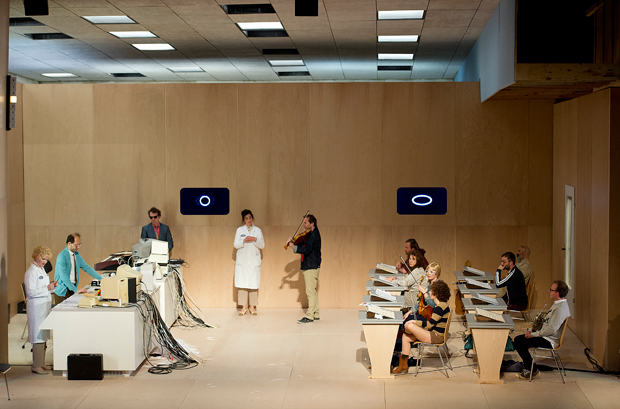
As part of MaerzMusik, the Berliner Festspiele’s massive celebration of contemporary music, Enno Poppe’s eccentric opera IQ comes to Berlin.
A Berlin composer distinguished with numerous prizes, Enno Poppe makes music that combines strictly organised structures with sensuous, organic sonority. Performing as a pianist and conductor as well, he has led the Berlin-based Ensemble Mosaik since it was founded in 1998. IQ is his third collaboration with author Marcel Beyer.
How did you come up with the idea to make an opera about IQ tests?
The starting point was the desire to create an opera with stage designer Anna Viebrock and author Marcel Beyer. We didn’t begin with the theme, but with possible structures. We wanted to make an opera where every act is a variation on the act before.
At some point I did suggest the IQ theme because I find it fascinating: what is that? What is this ‘intelligence’ that we measure with IQ tests? The concept of a number, resulting from a bizarre mix of various tests, following you for your whole life and supposedly saying something about your personality, that’s crazy! IQ tests actually emerged as part of the 19th century’s measurement madness, but what struck me is that those tests are still very much and uncritically used. They became a cultural technique to tidy people up in drawers.
So how do you make the IQ tests fit in music?
The variation of the musical acts becomes the variation of the IQ tests. There are eight acts presenting eight tests, becoming gradually longer and more abstract. The first act and test lasts only two and a half minutes, then four, then eight, until the last act, going on for half an hour. Part of the reason why we decided to work on IQ tests was because it went well with this idea of musical variations.
Another factor was because I wanted the musicians to be on stage as a part of the play. Of course they are neither actors nor singers, they can’t do everything. But they can take part in the IQ tests. There is for example a test where you have to repeat a ton: in this case, the musicians are tested as musicians. Although I’ve composed the piece, so they don’t really do the test, they play what I wrote, and we know in advance who will make the mistake!
And this person gets a bad IQ result.
Well, there are two key characters in the play who are not compatible with the system. There is this one guy who is basically too intelligent for the test: he finds answers that were not predicted and then gets bad results.
And then there is a woman who keeps getting better results because she really learns this culture technique of IQ tests – as a result it is not her intelligence that is being measured but her capacity to improve her test abilities. Beginning as a collective test, the opera gets you gradually closer to the different personalities, showing by their approach to the tests their absurdity.
Do you have a reason for putting your musicians onstage?
I like that! I find it beautiful. And I like the singing voice of musicians. Opera singers are great, but I can also find them boring: they have this quite rigid way of singing that they’ve learnt and it can be difficult to get something different from them. Instrumentalists are musically good enough to sing and create an interesting variety of sounds. I also work with a singing actress with a great voice. I certainly didn’t want to give a main role to a musician; they are always present as a group.
Anna Viebrock did the stage design. Did her scenography influence your music writing?
Yes, we worked together from the beginning. When I saw the first model of a scene, I wrote the music imagining how these people sitting in this test room with those test tables would make music within this stage situation. We decided for instance to hide microphones in the furniture, which means that the tables become musical instruments, able to play many different tones. We have also many accessories that we use as musical instruments. For the blues act, for example, I built a drum set with the copy machine – that was Anna’s idea.
This project is radically interdisciplinary and collective as oppose to ‘just’ composing music.
Yes, it’s really different, and it’s great. But in general I always work with people. When I ‘only’ write music, I usually write it for musicians that I know. I prefer it that way, then I can imagine the people, exactly what they do, how they use their instrument. That’s also why I don’t really like working with orchestras, because those 80 people are so far away, like a mass. It’s not a pleasure when I don’t know them.
Isn’t it problematic when your music can only be played by specific people?
Well, sometimes it can be. For example I did write the music for IQ for a particular opera singer, we collaborated a lot on the composition of the music, but then she cancelled two weeks before the beginning of the rehearsals. I thought it would be impossible to find another person to sing that, but then we found another singer and she’s doing it fantastically, very differently but it’s great. So I think that’s more something that I need for the writing process, to imagine the artist performing, but then another artist can possibly take the role.
IQ, March 13, 18:00, 14-15, 20:00 | Haus der Berliner Festspiele, Schaperstr. 24, Wilmersdorf, U-Bhf Spichernstr.
Maerzmusik runs March 14-23.


